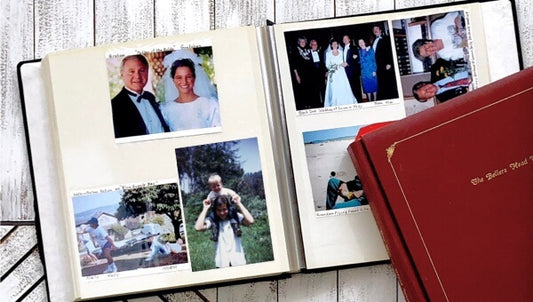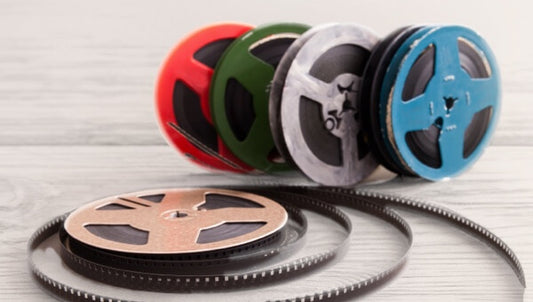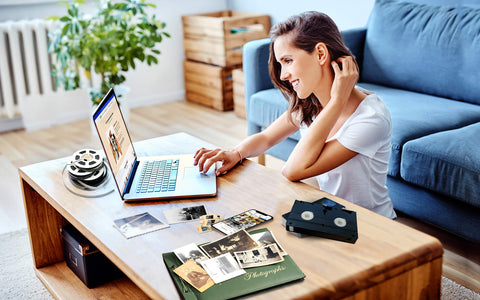Broken VHS tapes can be stressful, especially when they hold priceless home movies. Over the years, millions of people have dealt with issues like broken cassettes, ribbon tears, and dirty tape heads. The good news is that VHS tape repair is possible. Whether you’re looking for how to fix a broken VHS tape, how to repair a VHS tape with minor damage, or if you’re simply wondering can a VHS tape be repaired - the answer is often yes.
In this guide, we’ll cover the most common problems, walk you through steps for repairing VHS tape, share expert tips, and explore alternatives to DIY VHS tape repair so you can keep your memories safe.
Jump To:
- Quick Steps for Repairing Damaged VHS Tapes
- Alternative Options for Repairing VHS Tapes
- Types of VHS Tape Damage
- What types of damage need experts?
- DIY VHS Tape Repair Step-by-Step Guide
- Why You May Want to Use Capture Before Trying DIY Repair
- The Importance of Safe VHS Tape Repair
Quick Steps for Repairing Damaged VHS Tapes
Follow these simple steps if you’re wondering how to repair a VHS tape or need quick VHS tape repair before digitizing your home movies.
- Examine the tape and identify the type of damage.
- Open the VHS cassette casing with a Phillips head screwdriver.
- Carefully cut the tape to remove broken or crumpled sections.
- Splice the film together using splicing tape.
- Run the repaired tape through the pinch rollers and wind it back into the cassette.
- Replace the casing (use a new shell if the original is cracked).
- Test the tape in your VCR to make sure it plays correctly.
These are the basic steps for repairing the tape or replacing the case no matter what type you have including Panasonic and Sony standard VHS tapes, Super VHS (S-VHS), compact VHS (VHS-C), and even other videotape types like MiniDV.

Broken VHS tapes and even VHS-C tapes often hold priceless family memories.
However, more complex issues may require advanced methods. We’ll cover those in detail later, but first, let’s look at alternatives and why DIY repairing VHS tape might not always be the best option.
Alternative Options for Repairing VHS Tapes
DIY VHS tape repair can be an affordable way to keep your memories alive, but it also carries risks. If you don’t know exactly how to fix a VHS tape, you may damage it further or lose even more footage. Professional technicians can often identify hidden problems such as dirty tape heads, brittle plastic, or misaligned reels that make repairing VHS tape more complex.
Here are some safer alternatives to fixing a broken VHS tape yourself:
- Professional Repair Services – Specialists in repairing VHS tapes can clean, restore, and fix broken cassette shells, ribbon tears, and other issues. While more costly, they usually deliver the best results.
- Convert to Digital – Instead of focusing only on how to repair VHS tape, you can convert old home movies to digital. This creates a permanent backup you can save, share, and store anywhere. Many digitization services also handle repair broken VHS tape issues like damaged casings and minor ribbon splices.
- Recycle – If the tape is beyond saving or doesn’t contain important footage, recycling may be the best option. Some companies accept old VHS tapes for recycling to keep them out of landfills.
Types of VHS Tape Damage
There are several ways a VHS tape can break or degrade including broken casing, torn tape, wrinkled tape, broken leaders, demagnetization, and water damage.
Broken Cassette Case
A VHS cassette shell can crack from drops, heat, or years of sunlight exposure. As the plastic becomes brittle, it’s more likely to break. In this case, you may need to repair broken VHS tape by replacing the casing entirely.
Torn Tape
One of the most common problems is torn or snapped tape. When this happens, the cassette won’t play in a VCR. To repair a VHS tape in this condition, the film must be carefully spliced back together. Tears often happen suddenly during playback or rewinding.

A torn VHS tape can be repaired by splicing the film back together so it plays again.
Wrinkled Tape
The tape can also wrinkle and crinkle, which makes the tape unviewable. Creases occur with slackening, broken leaders, and other problems during playback. These wrinkles can be visible while you are viewing your precious memories. While you may wonder how to fix VHS tape with wrinkles, smoothing them out without damage usually requires professional tools and expertise.
Broken Leaders
The leader is the clear part at the end of the videotape that attaches it to the reel. They can break and cause your home videos to be unviewable. To repair VHS tape with broken leaders, you’ll need to reattach or replace the clear leader strip. Broken leaders can also contribute to other broken, crinkled, or creased tape, and this issue is especially common with smaller formats such as VHS-C tapes.
Demagnetization
Camcorder and VCR heads are designed to pick up magnetic signals and transmit them into images and sound. If exposed to too much magnetic force, the VHS tape could become demagnetized. Minor demagnetization may cause faded colors or sound, while serious exposure can wipe the footage completely. Unfortunately, there’s no way to repair a VHS tape once data is erased.
Water Damage and Mold
Humidity, leaks, or floods can cause mold growth and warping. If you’re considering repairing VHS tape damaged by water, carefully clean with distilled water and dry it slowly. Severe mold or mildew should be handled by professionals to avoid health risks and further damage.
What types of damage need experts?
While we recommend using experts for any VHS tape damage to ensure your home movies are never lost, DIY repair can be used for lots of minor issues. You can probably replace the cassette and perform minor splicing yourself as long as you are careful.
With water damage, mold, demagnetization, and heavily wrinkled or torn tape, you should avoid repairing the tape yourself. This is because these VHS repair issues are severe and require in-depth cleaning, splicing, drying, and other services.

Wrinkles, broken leaders, and cracks are common problems when repairing VHS tapes.
DIY VHS Tape Repair: Step-by-Step Guide
So, you’ve decided to repair your VHS tapes yourself. We’re here to help with step-by-step instructions for splicing, repairing crinkled tape, and cleaning the interior workings of the cassette box. This process will work for all VHS video cassette types including VHS-C tapes, S-VHS tapes, and S-VHS-C tapes as well as Betamax, Mini DV tapes, and other videotapes.
1. Safety Precautions
While fixing VHS tapes is not really dangerous for you as long as you use the scissors, utility knife, and screwdriver properly, it can be dangerous for your precious memories. If you repair the tape incorrectly, you could worsen the issues or cause new damage to the quality of your home movies. That’s why it’s so important to know how to repair a VHS tape before starting.
Use these tips as safety precautions:
- Read through every step before starting the repair.
- Avoid using adhesive tapes like Scotch tape.
- Make sure there are no magnets nearby.
- Never repair tapes that are wet or humid.
- Don’t rush the process.
While this process works for audio cassettes too, there are some differences so make sure you look up a separate guide.
2. Tools Needed
For videotape repair, you will need:
- Original VHS tape
- Screwdriver
- Scissors
- Splicing tape
- Replacement cassette case
3. Open Cassette Shell
To fully inspect and repair a VHS tape, you’ll need to carefully open the cassette shell.
Follow these steps:
- Remove any adhesive labels from the outside of the VHS cassette shell.
- Use a Phillips head screwdriver to take out the screws—one in each corner and one near the center.
- Lay the cassette flat on a clean surface.
- Gently pull the front half of the shell off using a light wiggle motion.
- Press and hold the white lever at the bottom center of the VHS tape box to unlock the reels.
- While holding the lever down, carefully remove the reels to avoid wrinkling or damaging the tape.

DIY VHS tape repair works for many cassette types, but a VHS to digital service is the safest way to preserve your movies.
4. Identify Damage
Identify the damage based on the types of VHS tape damage outlined above. Look for mold and moisture, damage to the tape itself, wrinkles and creases, and leader damage. You should also check the cassette casing for damage or brittleness.
5. Fixing a Broken Cassette
If the plastic cassette is broken or the screws are worn out, you should replace it with a new one. You can buy new cassette shells online or take one from a VHS tape you have that’s in better condition. Even slight damage to your cassette can make it easier for dust, debris, and moisture to seep through.
Put the reels of tape inside the cassette shell and then screw the other half in. That’s all there is to it!
6. Repairing Broken or Wrinkled Tape
Broken or wrinkled tape is one of the most common problems, but with careful splicing you can repair a VHS tape and save the remaining footage. Follow these steps:
- Identify damaged sections – Look for frayed, wrinkled, or broken areas of tape that need to be removed. Keep in mind that every 1.5 inches equals about one second of video in Standard Play (SP) mode.
- Cut the tape – Use scissors or a utility knife to carefully cut out the damaged section, leaving two clean ends on the reels.
- Prepare splicing tape – While some people try Scotch tape, it’s not recommended. Instead, use proper VHS splicing tape. Cut a 2–3 inch piece and place it sticky side up on a flat surface.
- Attach the first end – Lay one end of the VHS tape on the splicing tape so that the underside covers half the strip.
- Attach the second end – Place the other end of the VHS tape on the opposite side of the splicing tape, edges aligned with no gaps or overlaps.
- Secure the splice – Wrap the splicing tape around the VHS tape to ensure both ends are firmly connected.
By carefully repairing VHS tape in this way, you may lose a few seconds of video but you’ll successfully fix broken VHS tape sections and preserve the rest of your home movies.
7. Repairing Broken Leader
A broken leader is very similar to splicing regular tape, but for this you can use Scotch tape without any worries. First, identify the spool where the leader broke from. Then, wrap the adhesive end of the tape around the center of the reel with around 2 inches remaining. Attach the leftover portion to the end of the tape.
8. Replace Reels
Once you’ve completed your splice or other repairs, the final step in repairing VHS tape is putting the reels back in place.
- Wrap the tape around the guides – Carefully thread the magnetic tape around the metal tape guides inside the cassette. One reel will have a guide roller (a small plastic spool) that helps direct the tape - make sure it’s looped correctly.
- Position the reels – Place both reels back into their slots in the shell, ensuring the tape is aligned and flat.
- Wind the tape manually – Turn the reels by hand to pull the tape back into the cassette area. The tape should be neat, taut, and evenly wound.
- Check tension – The tape should move smoothly with light pressure and snap back into place when released. If it’s too tight or too loose, adjust before closing the shell.
By carefully replacing and aligning the reels, you complete the process of how to fix a VHS tape and get it ready for playback or digitization.
9. Close Cassette and Test
Reassemble the top of the cassette shell and screw all 5 screws into place. Then, put the VHS tape into a VCR player to test it out. If it doesn’t work, then make sure the VCR works with a separate tape. If other tapes work, then you may have to use one of the alternatives to DIY tape repair like professional VHS repair service or digital transfer service. To find a local service, try searching for “VHS tape repair near me.”

Repairing VHS tapes helps, but digitizing ensures your memories last for generations.
Why You May Want to Use Capture Before Trying DIY Repair
Capture offers minor VHS repair services in addition to digitization for your priceless home movies. There are lots of reasons to choose our services before trying to repair the tapes on your own.
Less Risk
With over 20 years of experience, we at Capture know what we are doing and will make sure that your VHS tapes aren’t damaged even more. In many cases, improper DIY repair does more harm than good. Our repair services include cleaning and mold removal, basic ribbon damage, and repairing or replacing broken cases.
Digital Format
When you use our service, you preserve your home movies as high-quality digital copies while also getting your VHS tapes back in as good or better condition. This makes it easier to view and share your memories on any device or with social media.
Guarantees and Security
Our digitization services are backed by our 100% satisfaction guarantee to ensure you are happy with the digital results. Plus, our top-of-the-line security system tracks your videotapes every step of the way, through every hand, and right back to your doorstep.
Fast Turnaround
Learning how to repair a broken VHS tape takes time. Then, performing the process on several VHS tapes takes even more time. We can digitize and perform minor VHS repairs, return your tapes, and finalize digital versions in less than 30 days including shipping.
The Importance of Safe VHS Tape Repair
VHS tapes can break in many ways, cracked shells, wrinkled film, or worn parts, that put memories at risk. Small issues can sometimes be fixed at home, but DIY VHS tape repair is risky and may cause more harm. Capture offers safe VHS to digital transfer service and can perform minor VHS tape fixes, like broken shells or basic ribbon repairs, before transferring your home movies to digital. Once preserved, your videos are easy to share, organize with captions, and keep safe for generations.











